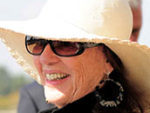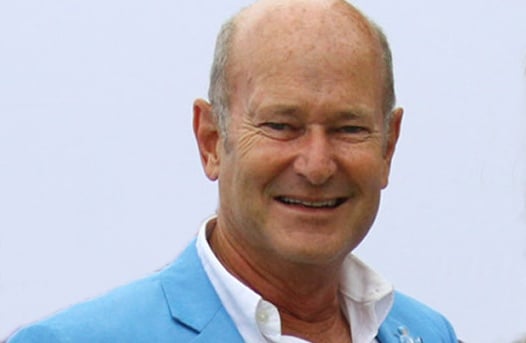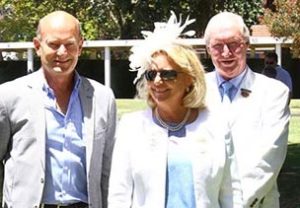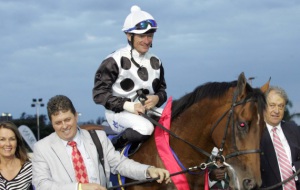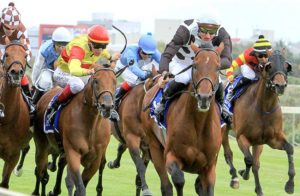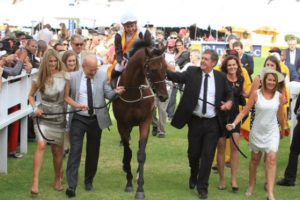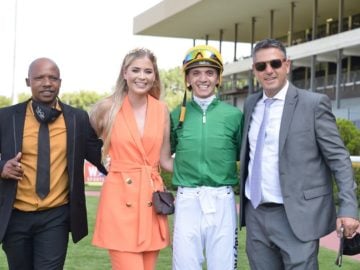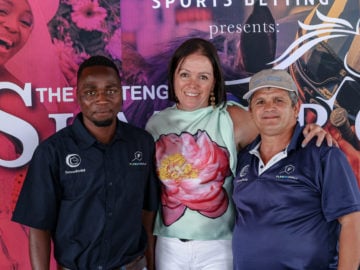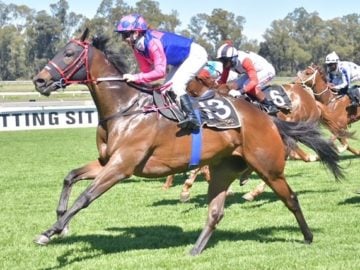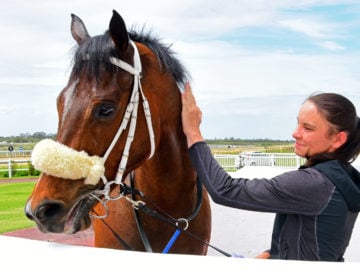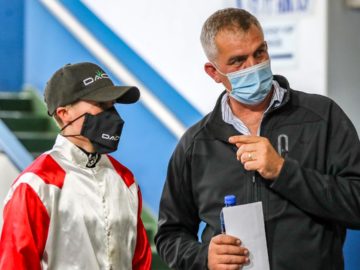Those with a penchant for self-help and motivational type books will be familiar with the theory that happy people are more productive. Increased productivity increases the chances of success and success creates a sense of achievement and happiness. Work satisfaction results in more endeavour, more achievement and more satisfaction and in this way, the cycle perpetuates itself. In short, the theory runs that the happier you are, the more you achieve and therefore the happier you become. Therefore people who achieve success are those who genuinely love what they do and can’t wait to get to work in the morning.
The Thoroughbred Group offices are in a nice part of Cape Town, in a converted warehouse building overlooking a small, private square. The offices aren’t enormous, but they are neat and orderly and every available space is occupied by the paraphernalia associated with John Freeman’s stock in trade – the Thoroughbred. Most of the back wall is dedicated to sales catalogues – scores of them. John has a complete collection dating back to the very first catalogue issued by Meikle & Co. More recent editions bristle with colourful tags and notes – all carefully colour-coded by client. It is an opus.
When I arrive, John is poring intently over his desktop publisher’s shoulder, contemplating advertising proofs for the latest addition to his growing portfolio of stallions. A photograph may seem a triviality to some, but, as evidenced by the meticulously ordered office, where John is concerned, no detail is too small. He has built up a small, but dedicated team of like-minded assistants and when we retire to his office for a chat, the door remains open and there is still dialogue circulating and thoughts, opinions and information shared on an on-going basis.
About John
John is a third generation horseman and proudly displays a photograph depicting his father (John snr) having ridden his horse into a bar after a steeplechase event. His father, described as a ‘bon vivant’ was a secretary to the Chamber of Mines, before briefly being headhunted to run the Tugela Estate operation for industrialist C C Taylor. Forced to evacuate when the tribal war broke out, the family moved back to Johannesburg and John snr joined Old Mutual. With a keen interest in the field of life insurance, a stroke of misfortune over a horse prompted John snr to write the first insurance policy for a horse in South Africa, an initiative that blossomed into a thriving business. John remembers accompanying his father to yearling sales as a runner and assisting in insuring young stock from a very young age.
John completed his schooling at Marist Brothers’ College. It is a small detail, but the experience left a deep impression as well as forging friendships that have lasted for life. John did his military service being conscripted directly into the SA Army Gymnasium. “I was always very competitive and was promoted to the rank of officer by the time I was done.” He managed two years of law at Wits University, but realised he was wasting his time and left to join his father’s business. The rest, as they say, is history and John has built up a solid career covering a number of aspects of the industry, notably helping to establish the SA Horse Import Export Council.
Having served on just about every committee and official body around, and watched more horses pass through sale rings than most of us have had hot dinners, John is arguably one of the most experienced in the business and has some great stories to show for it. A favourite relates to the star filly Enchanted Garden, whose purchase was secured with a diamond ring as security. He relates “I have always dealt with the sort of people who do business on trust and a handshake” and he was eventually repaid in full – quite literally – with a shopping bag full of bank notes!
Debate
Communication and open debate on industry matters has always been close to his heart and efforts in this area include the publication of The Yearbook, The Freeman Newsletter and more recently, the SA Turf Directory, now in its 30th year. John chuckles, “I used to be a firebrand, but I’ve mellowed a lot.”
 However, an issue that is very close to his heart is the matter of restricted races and their potential to affect national statistics. As matters stand, the NHRA statistics credit owners, trainers and jockeys with all earnings, but not sires and breeders. While restricted races are not a South African anomaly, we are unique in offering restricted race stakes that outstrip the prize money offered for our most prestigious graded races. With a number of important statistics – including champion sire, breeder, owner and trainer – based on earnings, it is important that the issue be weighed carefully.”
However, an issue that is very close to his heart is the matter of restricted races and their potential to affect national statistics. As matters stand, the NHRA statistics credit owners, trainers and jockeys with all earnings, but not sires and breeders. While restricted races are not a South African anomaly, we are unique in offering restricted race stakes that outstrip the prize money offered for our most prestigious graded races. With a number of important statistics – including champion sire, breeder, owner and trainer – based on earnings, it is important that the issue be weighed carefully.”
John is vehemently opposed to the inclusion of restricted race earnings to national statistics and opines, “Restricted races are a clever marketing ploy and must remain just that: an inducement to a sale and a good promo for racing. Nowadays buyers are offered restricted races worth in excess of R12 million and soon to be increased to over R20million, including one event worth R3.5million, an entire day worth R2,6 million, at least three R2m events to which a US$1m race will soon be added. All of these events are serialised with cross-qualification possible simply by going through a sale ring where one sale graduate could potentially win more than one of the events and maybe even all of them in one season. If these earnings are allocated to our national statistics, any winning trainer, breeder, sire and owner might find themselves crowned national champion on the strength of those wins and all of the national logs will be vulnerable to gross distortion.”
What makes a champion?
“Our racing program has highly competitive Gr1 races that are run for far lower stakes than the restricted races. Winners of these restricted races rarely graduate to Gr1 level. The effect of allowing the results of those non-competitive “races” into the record as a measure of quality will make a mockery of our awards.”
“I can best illustrate how ludicrous our stats will look by using the Owners log. If the NHRA allowed a winner of two of the new sales promotional races to be added into the stats – a winner of those two races could conceivably be crowned Owner Of The Year by virtue of just one runner. Compare last season’s leading owner whose runners amassed R15.1m in 1078 races. We saw two partnerships listed at 7th and 8th position on the log through the ownership of real champions; Legislate and Yorker who won 3 Gr1 races apiece. How would we justify looking at the log and finding the 2nd leading owner with 2 runs, 2 wins and R9m to his credit?”
“It’s equally absurd that an otherwise unsuccessful trainer might become national champion trainer by fluking a horse that can win a series of restricted races. It would be an affront to the hard work done by the chaps that support our industry with hundreds of top class runners throughout the year. Imagine top trainers like Mike de Kock, Justin Snaith, Sean Tarry, Mike Bass, Dennis Drier, etc having a bumper year winning the July and the Met and a few other Gr1 races and losing the championship to someone who got clever enough to find a horse at the Ready To Run sale that can do what the organisers aim to achieve; win a series of the huge bonus stakes on offer. In fact, I’m surprised that the trainers have not taken up this cause. Do we really want the winner of a series of restricted races to be crowned Champion Trainer or Horse Of The Year for that matter?”
“Years ago, jockeys were asked to decide their own fate and elected number of wins as the deciding factor for their championship. I’m told that NHRA staff have been tasked to canvas trainers for their opinion, but given the lack of a national trainers’ body, it is not an easy task.”
Divisive issue
In late 2014, the NHRA hosted a workshop to discuss the matter, although the general racing public is still waiting to hear what, if anything, was discussed and decided. John says, “There was talk of keeping multiple logs – one to exclude restricted race earnings, one to include restricted race earnings and another to recognise international earnings. Are we to contemplate the possibility of having multiple champion stallions, breeders, trainers, etc? We’d be an international laughing stock! With some industry publications publishing all earnings and the NHRA publishing a mixed bag of logs, it is clear that opinions are strongly divided and the matter needs to be settled once and for all.”
“What if anyone bought a bunch of the best youngsters at the $1m sale and entered them on all of the Bonus Stake sales and found a horse that could win all of the added stakes? Even if he never won a listed race he’d go on record as the highest earner in the history of SA and thereby become champion and maybe even Horse of the Year!”
“In addition, we all know that restricted races can be manipulated by reoffering a suitable candidate at all of the “bonus sales” and buying them as qualifying candidates. We have already seen horses being reoffered and bought back for this purpose. Official acknowledgement of this type of practice could lead to all sorts of manipulation. Imagine that I find a rich investor from the East who fancies his stallion’s name in highlights. We conspire to set up a race for progeny of that sire (or any group of sires) the value of which would make the sire an overnight “champion” – how would the NHRA stop that from happening? It’s not as preposterous as it sounds. Some years ago Jallad lost the sire championship by a mere R50,000 because of an end of season addition of a R250,000 low division “Challenge Race” that distorted the stats in the last weekend of the season. Including these restricted events could mean that anyone could buy a result.”
“Anti-competitive practice is poison to the integrity of our industry, especially in a business like ours where the main aim, beyond profit, has always been the pursuit of excellence beyond cost. We must all support free enterprise in racing and races restricted to sales or specific events are a fait-accompli, but as restricted events they must not distort the outcome of championships and accurate and open record keeping.”
But enough of politics
Despite a lifetime in the business, it is clear that John has lost none of his enthusiasm or passion for the industry. Having also been rewarded with the joy and satisfaction of owning a share in Queen’s Plate and Met winner, Futura, John is also finally enjoying the fruits of his labour after decades of endeavour. It is a rare and special place to be and John is the happiest and most fired up I have ever seen him.
“Who could wish for anything better – being passionate about your work and enjoying the company of remarkable people? My clients are my friends and I am able to see the results of my work playing out every single day. My life is horses. I can’t imagine doing anything else.”
So if the question is, ‘do you whistle your way to work in the morning?’ the answer in John Freeman’s case is a definite yes.
‹ Previous
